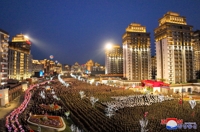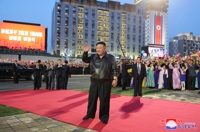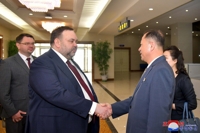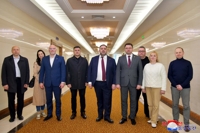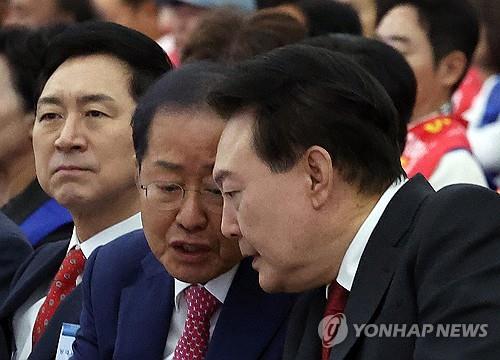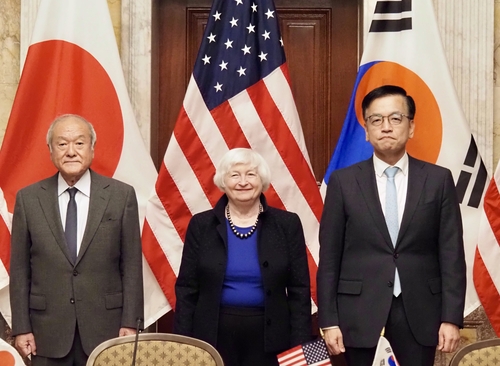Parties present mixed scorecards for Moon's first 100 days in office
SEOUL, Aug. 16 (Yonhap) -- President Moon Jae-in's first 100 days in office got mixed scorecards Wednesday as opposition parties denounced his appointment mishaps, policy disputes and cross-border tensions, while the ruling party touted his push for reform and peace.
A day before the 100th day since Moon's inauguration, the conservative parties accused the president of unilaterally pushing for the liberal agenda dear to his heart on the back of public support that has been hovering well above 70 percent.
The governing Democratic Party countered that Moon has laid the groundwork for restoring democracy and justice that has been rattled by a massive corruption scandal involving former conservative President Park Geun-hye.
Chung Woo-taik, the floor leader of the main opposition Liberty Korea Party, staged a press conference to highlight its discontent with the young government's handling of state affairs, claiming that it has been "incompetent, self-righteous and populist."
Chung, particularly, took issue with Moon's ongoing reform drive to eliminate the "accumulated evils" of past governments, portraying it as "political retribution" that has exacerbated ideological division.
"The Moon administration was elected with pledges to remove the accumulated evils, but there seem to be little it has redressed. ... Rather, it has accumulated new evils in terms of security, personnel and policy," Chung told reporters.
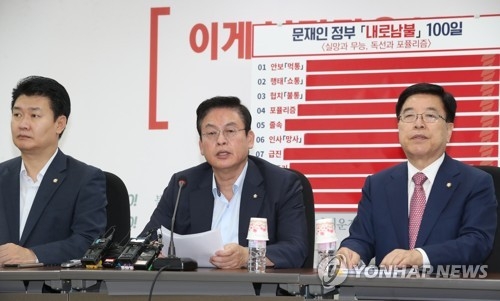
Chung Woo-taik (C), the floor leader of the main opposition Liberty Korea Party, speaks during a press conference at the National Assembly in Seoul on Aug. 16, 2017. (Yonhap)
"The removal of accumulated evils has now become synonymous with political retribution, ideological bias and rough-and-ready (policies)," he added.
He also lambasted Moon's contentious personnel appointments and nominations, which led some to quit in the face of searing public and political opprobrium, and his seemingly dovish stance over an increasingly belligerent Pyongyang.
"Moon has pledged to take the driver's seat in handling issues surrounding the Korean Peninsula but aren't we in a situation where we are taking a back seat let alone a passenger's seat," Chung said.
"If we just beg for dialogue with the North and pass our time without substantive measures, we will face the so-called Korea passing," he added, referring to a situation in which Seoul is sidelined by major powers in important security affairs concerning the peninsula.
The North's continued provocations, including its long-range missile tests last month, have provided political fodder for the conservative bloc to accentuate its professed security forte and sharpen criticism of the liberal camp's traditionally dovish approach.
Yoo Seong-min, the former presidential candidate of the Bareun Party, joined the criticism, urging Moon to retract his key security decisions, such as shortening the mandatory military service period for draftees and suspending the full deployment of a U.S. missile defense system pending an environmental impact assessment.
"For genuine peace, we have to make perfect preparations against any potential warfare," he said in a lengthy Facebook post.
Brushing aside all criticism, ruling party leaders stressed that Moon's high approval rating attests to public satisfaction with his policy initiatives.
They mentioned the government decisions to raise the minimum wage and tax rates for top-earning individuals and conglomerates, and efforts to address unfair business practices and real-estate speculation as the Moon government's major feats.
"We want to cautiously evaluate that we got the passing mark from the public regarding Moon's 100 days in office," Woo said in a radio interview.
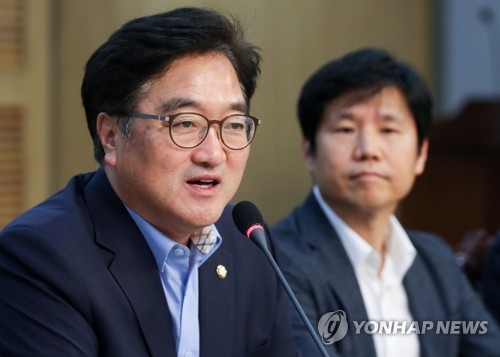
Woo Won-shik, the floor leader of the ruling Democratic Party, speaks during a forum on nuclear energy policy at the National Assembly in Seoul on Aug. 16, 2017. (Yonhap)
The ruling camp also sought to close ranks ahead of a regular parliamentary session slated to begin next month. The session is expected to be a political battleground over a series of legal revisions the Moon government is pursuing to retool the tax code and reform power organs such as the prosecution and spy agency.
sshluck@yna.co.kr
(END)
-
 Defense chief says N. Korea's hypersonic missile 'unsuccessful' in last-stage glide flight
Defense chief says N. Korea's hypersonic missile 'unsuccessful' in last-stage glide flight -
 Relax, immerse yourself in scents at Venice Biennale's Korean Pavilion
Relax, immerse yourself in scents at Venice Biennale's Korean Pavilion -
 N. Korea has capability to genetically engineer biological military products: U.S. report
N. Korea has capability to genetically engineer biological military products: U.S. report -
 Overdue debut of Korean abstract art pioneer Yoo Young-kuk at Venice Biennale
Overdue debut of Korean abstract art pioneer Yoo Young-kuk at Venice Biennale -
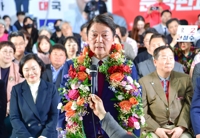 PPP lawmaker says entire Cabinet should resign over general elections defeat
PPP lawmaker says entire Cabinet should resign over general elections defeat
-
 Relax, immerse yourself in scents at Venice Biennale's Korean Pavilion
Relax, immerse yourself in scents at Venice Biennale's Korean Pavilion -
 Overdue debut of Korean abstract art pioneer Yoo Young-kuk at Venice Biennale
Overdue debut of Korean abstract art pioneer Yoo Young-kuk at Venice Biennale -
 Defense chief says N. Korea's hypersonic missile 'unsuccessful' in last-stage glide flight
Defense chief says N. Korea's hypersonic missile 'unsuccessful' in last-stage glide flight -
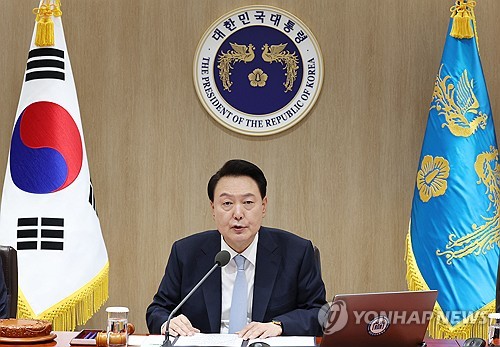 (LEAD) Yoon vows to improve communication with people after election defeat
(LEAD) Yoon vows to improve communication with people after election defeat -
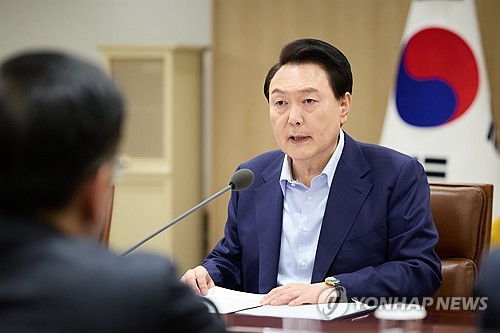 Yoon presides over emergency meeting on Mideast crisis
Yoon presides over emergency meeting on Mideast crisis
-
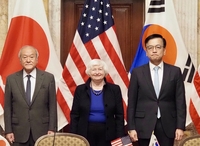 (4th LD) Finance chiefs of S. Korea, U.S., Japan recognize 'serious' concerns over 'sharp' won, yen depreciation
(4th LD) Finance chiefs of S. Korea, U.S., Japan recognize 'serious' concerns over 'sharp' won, yen depreciation -
 S. Korea to provide 100,000 tons of rice to 11 nations
S. Korea to provide 100,000 tons of rice to 11 nations -
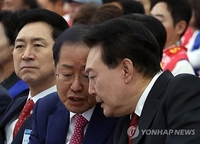 Yoon, Daegu mayor met to discuss post-election matters: sources
Yoon, Daegu mayor met to discuss post-election matters: sources -
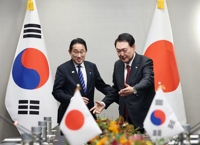 (LEAD) Yoon, Kishida agree to deepen trilateral ties with U.S.
(LEAD) Yoon, Kishida agree to deepen trilateral ties with U.S. -
 Heart disease patient in her 60s dies after surgery delay amid medical vacuum
Heart disease patient in her 60s dies after surgery delay amid medical vacuum















